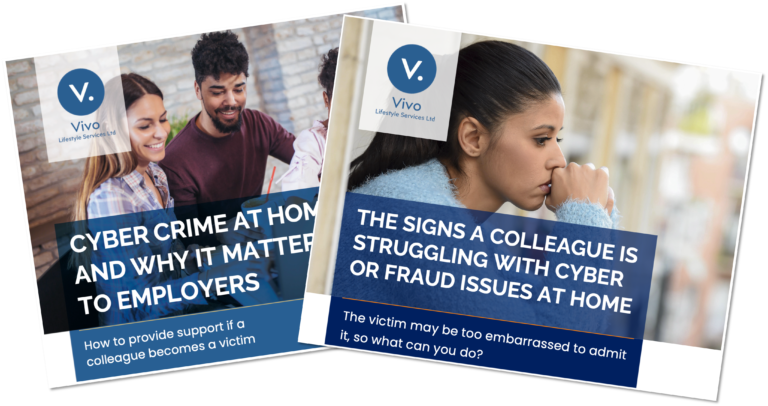Digital Wellbeing
That’s why we not only make our services available as schemes that can be easily added as a perk or employee benefit, we provide the materials and education necessary to support businesses should they become concerned that a colleague is suffering with issues related to cyber crime and online fraud.
In addition we can help to bring in experts to help individuals dealing with anxiety, stress or other conditions related to what might be happening to them out of sight at home.

How personal cyber crime affects the workplace
However, most of us tend to keep a “professional air” when we’re at work and that can mean different things to different people.
Some of us tend to share more by nature. So, especially with closer colleagues, some might share more about their personal and family lives than others. Some will tend to be a little more guarded. It’s a pattern of human relationships and behaviour that has evolved over decades – centuries even.
Sadly, the impact of some kind of cyber event in our personal lives – be it financial fraud, a relationship scam, romance scam or hack of one or more of our personal accounts – can be so significant and traumatic that behaviours can change overnight.
With more than 70% of us having been targeted by scams in the last 12 months, and each of us seeing on average 3 scam messages a week, the issue is far more common than we might hope it is.
Outcomes
The best outcome is that those who shared before will continue to share. Colleagues and managers are in a much better position to be able to help if they know a problem exists in the first place.
For those who are generally more chatty, many will find it hard to share something that they might find so deeply humiliating (and sadly that humiliation often feels like it is being compounded when reporting incidents to the authorities), so embarrassing, that they simply shut that part of their lives off in work conversation.
Emotions
Anger. Stress. Sadness or depression. Difficulty sleeping. Loss of confidence. A sense of loss or betrayal.
Many life events can give rise to the above emotions, thoughts and feelings.
Sadly, nowadays, we have to add the possibility that it might be down to the immediate or ongoing effects of cyber or online crime.
And we also have to realise that, for this new kind of crime – this humiliating, embarrassing crime – the thing that is often in shortest supply is empathy, understanding, a listening ear.
Many of us have become trained – formally or informally – in how to listen, support and help colleagues following bereavement, ill-health, separation, divorce or some other event that we might view as a “traditional” life event. But with the prevalence of cyber crime so high, and us being targeted so relentlessly, we need to extend our “training” to recognise the signs, understand the symptoms, listen to what has happened and be ready to support any of our colleagues who might have become the victim of such a far-reaching, ever-expanding and very personal attack on the individual.

Education and prevention
We are committed to being there not just as a 24/7 emergency helpline AFTER something happens, we want to help individuals, families and employers:
- to understand, appreciate and avoid the scams and traps that are out there
- to be in a position of knowledge and empowerment to help yourself and others
- to know what to do if something goes wrong, and
- to know how to understand, support and help others if they become a victim of cyber crime
So we have produced a suite of flyers and leaflets to help employers navigate a new era where cyber crime at home can drastically affect the health and wellbeing of their staff.
We’re also always very happy to take part in webinars or training sessions to help broaden education on the subject.
At your disposal too is our Cyber Made Easy consumer portal for those who want to take their own online security that next step further.
We write our own authoritative, targeted content in a totally jargon-free and relatable way – designed specifically for those who want to take their own online security that one step further.
There you will also find curated software, tools and downloads from global, blue-chip cyber security brands such as Norton, Bitdefender and McAfee – many of which are available on special offer or are free-to-try (or even free!).
Our consumer site also hosts our VIVO-trained AI chat assistant Erica – for members only – who can help customers with non-cyber emergency issues like “How do I upgrade my iPhone?” or “How do I switch ‘Do not Disturb’ on and off on my Samsung A3 phone?”. Erica’s great at knowing the answers and always delivers them in a plain English instantly understandable way.
If you would like to know more about what we can offer your organisation, please contact us.
